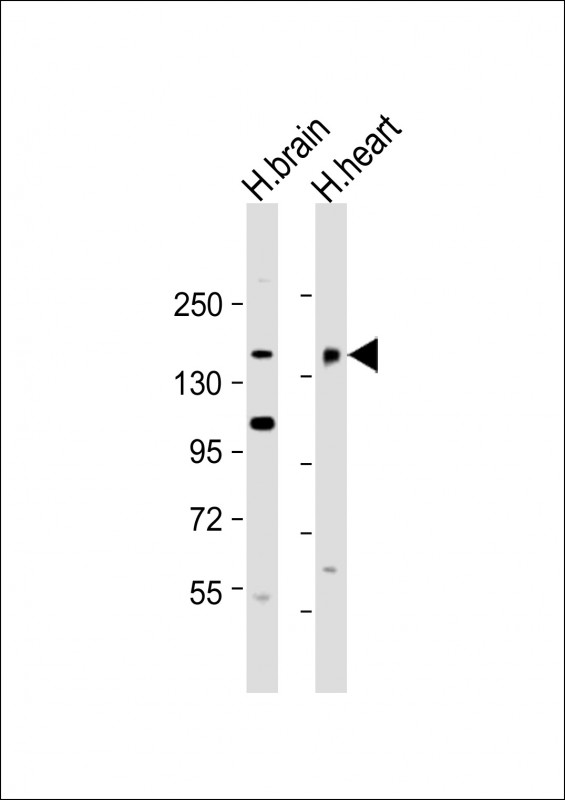
| WB | 1/2000 | Human,Mouse,Rat |
| IF | 咨询技术 | Human,Mouse,Rat |
| IHC | 咨询技术 | Human,Mouse,Rat |
| ICC | 技术咨询 | Human,Mouse,Rat |
| FCM | 咨询技术 | Human,Mouse,Rat |
| Elisa | 咨询技术 | Human,Mouse,Rat |
| Aliases | Microtubule-associated tumor suppressor candidate 2, Cardiac zipper protein, Microtubule plus-end tracking protein TIP150, Tracking protein of 150 kDa, MTUS2, CAZIP, KIAA0774, TIP150 |
| Entrez GeneID | 23281 |
| WB Predicted band size | 150.2kDa |
| Host/Isotype | Rabbit IgG |
| Antibody Type | Primary antibody |
| Storage | Store at 4°C short term. Aliquot and store at -20°C long term. Avoid freeze/thaw cycles. |
| Species Reactivity | Human |
| Immunogen | This MTUS2 antibody is generated from a rabbit immunized with a KLH conjugated synthetic peptide between 917-949 amino acids from human MTUS2. |
+ +
以下是关于MTUS2抗体的3篇参考文献,包含文献名称、作者及简要摘要内容:
---
1. **文献名称**:*MTUS2/ATIP3A Acts as a Tumor Suppressor in Colorectal Cancer by Directly Targeting c-MYC*
**作者**:Zhang Y, et al.
**摘要**:该研究通过免疫组化(IHC)和Western blot分析,发现MTUS2在结直肠癌组织中表达下调,并与c-MYC通路相互作用抑制肿瘤生长。MTUS2抗体被用于检测其在细胞质中的定位及表达水平。
---
2. **文献名称**:*Microtubule-Associated Tumor Suppressor Gene MTUS2 Regulates Mitotic Progression*
**作者**:Burotto M, et al.
**摘要**:研究利用MTUS2抗体进行免疫荧光染色,发现MTUS2通过调控微管动力学影响有丝分裂进程,其缺失导致染色体分离异常,提示其在维持基因组稳定性中的关键作用。
---
3. **文献名称**:*ATIP3A/MTUS2 Is a Potential Prognostic Marker for Hepatocellular Carcinoma*
**作者**:Wang L, et al.
**摘要**:通过免疫组化和组织芯片技术,研究证实MTUS2在肝癌组织中低表达与患者不良预后相关。MTUS2抗体用于量化肿瘤组织中的蛋白表达水平,提示其作为潜在生物标志物的价值。
---
这些文献均通过MTUS2抗体探究了该蛋白在肿瘤抑制、细胞周期调控及临床预后中的作用,涵盖实验方法如Western blot、免疫组化和免疫荧光。
The MTUS2 (Microtubule Associated Scaffold Protein 2) gene encodes a microtubule-associated protein implicated in regulating cytoskeletal dynamics and cellular processes such as proliferation, migration, and intracellular signaling. Belonging to the MTUS family, MTUS2 contains conserved coiled-coil domains that facilitate interactions with microtubules and other proteins, suggesting roles in maintaining structural integrity and signal transduction. While less studied than its homolog MTUS1. MTUS2 is proposed to act as a tumor suppressor, with reduced expression observed in certain cancers, potentially linked to dysregulated cell cycle progression or metastasis.
MTUS2 antibodies are essential tools for investigating the protein's expression, localization, and function. They are widely used in techniques like Western blotting, immunohistochemistry, and immunofluorescence to study MTUS2's tissue distribution, subcellular localization (e.g., cytoplasmic or microtubule-associated), and alterations in pathological conditions. Research has explored its involvement in diseases such as cancer, neurodegenerative disorders, and cardiovascular pathologies, though mechanistic insights remain limited. Current studies focus on clarifying its interaction networks, post-translational modifications, and tissue-specific roles. MTUS2 antibodies thus serve as critical reagents for advancing understanding of its biological significance and therapeutic potential.
×